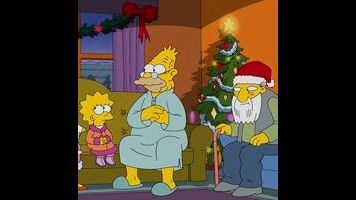The Simpsons: “I Won’t Be Home For Christmas”

In theory, a Christmas episode should be any aging show’s best friend. Independent of religion or resolute cynicism, it’s hard not to grant any Christmas episode some sympathy slack. Even the crustiest among us soften up in the face of a good, old-fashioned Christmas “fight and then make up” story, so “I Won’t Be Home For Christmas,” while pretty standard as far as such things go, gets points for applying the formula so assiduously (and throwing out a handful of funny touches along the way).
If the episode has a central flaw, it’s how rushed the conflict between Marge and Homer is. The Simpsons’ “Homer is a bad husband” story is a top five series trope, which isn’t a bad thing—at its best, the show finds ways to use its endlessly rewritable history to come at familiar sitcom tales from a variety of angles. This time, however, Marge’s rejection of Homer—after he succumbs to Moe’s roadblock and clock trickery and shameless begging and doesn’t come home until just before midnight on Christmas Eve—is too abrupt to drive the plot. Especially Marge’s musing, “With this marriage in this much trouble he’s got a lot of thinking to do,” comes out of nowhere. Homer and Marge’s marriage is and should be in varying degrees of trouble thanks to Homer’s actions in most episodes, but simply having Marge drop such a weighty line here isn’t adequately motivated, and it makes their reconciliation (a dramatic necessity) feel not just inevitable, but perfunctory. Plus, the fact that Homer is only late because he was first tricked by, and then doing something nice for, Moe makes Marge’s usually justifiable dissatisfaction with her husband come off as unreasonable.
So much for the Grinchiness—there’s a good deal to like in “I Won’t Be Home For Christmas,” starting with everyone’s favorite bartender. Hank Azaria never seems to be having more fun than when voicing Moe Szyslak, and the crippling loneliness that drives Moe to ply Homer with Duff on Christmas Eve is both very funny and improbably affecting, with his protestations of independence immediately crumbling into amusingly needy physical comedy. “Look, I’m wrapped around your leg here—Now I’m sitting on your shoulders. Please!” More often than not played as a callous joke, Moe can deliver some unexpected soulfulness (mixed with awfulness, naturally), as when tonight he stuffs himself down the Simpsons’ chimney to get Homer off the hook with Marge. (And his Moe logic as he tumbles out of the fireplace is classic Moe: “Your door was locked, so rather than call or knock I thought I’d come down the chimney there.”) And, as usual, Moe’s crush on Marge (or “Midge”) leads him to furtively ardent creepiness, trying to score a kiss under anything that looks like mistletoe. (It’s a piece of lettuce caught in a spider web.)
Meanwhile, Homer’s dark Christmas Eve of the soul leads him on a nondescript trudge through some uninspired sign gags (the anchor store “Anchor Management,” for example), ending with him taking in a new Seth Rogen/Jonah Hill concentration camp soccer drama at the all-but-abandoned movie theater (again, the joke title “The Beautiful Game” lands like a deflating soccer ball) alongside Gil, Willie, the crazy cat lady, and Kirk Van Houten (who may or may not be separated from Luanne again). Here, too, Homer’s journey of self-discovery doesn’t land with the resonance of some of his past journeys of self-discovery, but his moment with Flanders (buying an unnecessary left-handed eyelash curler) is sweet—and punctured nicely by Flanders line once Homer freaks out and flees. (“My best friend is a great runner!”)
 Keep scrolling for more great stories.
Keep scrolling for more great stories.
